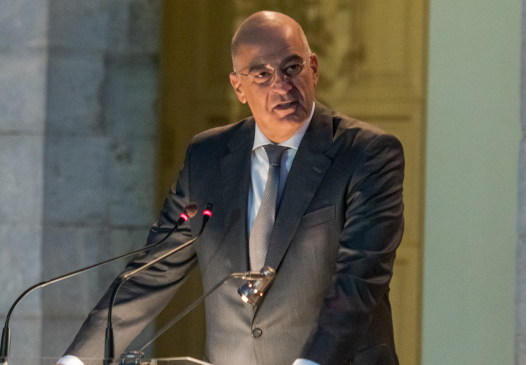 Ministers,
Ministers,
Secretary General,
Dear Madam President,
Madam Director of the Museum which hosts the exhibition,
Ladies and gentlemen,
It is with a sense of special honour that I inaugurate the exhibition of more than 200 documents from the collection of the Diplomatic and Historical Archives of the Ministry of Foreign Affairs.
This Exhibition is organized on the occasion of the celebrations for the 200th anniversary of the beginning of the Greek Revolution.
The exhibition was first presented online, a few days before the 25th of March. Then, as the Director said previously, it travelled to Perth, Melbourne, Shanghai and Algiers.
Today we have the pleasure to present it to the citizens of Athens, displayed in the imposing and welcoming Byzantine and Christian Museum, this Ark of the Byzantine-Christian tradition in the capital of modern Hellenism. This tradition, the Byzantine-Christian tradition, constitutes an extremely important legacy in the history of mankind.
And I am given the opportunity to emphasize the obligation of all states to protect this Cultural Heritage. To protect, in particular, the monuments of this heritage, such as Hagia Sophia, such as the Monastery of Chora, that are part of the World Cultural Heritage. Unfortunately, these monuments are now being used for other purposes, in violation of the relevant international commitments undertaken.
Greece, along with several other countries, the overwhelming majority of countries in the world, deeply regrets this incomprehensible choice of the Turkish government. It is a choice that was combined, at least until recently, with the close support to the Muslim Brotherhood as a political movement and not solely as a religious phenomenon; with the support to the Muslim Brotherhood’s attempt to destabilize a number of countries in the region, countries which are friends of Greece.
We expect Turkey to alter its neo-Ottoman policy; to strengthen the signals of the faintly visible turn it appears to be making; to return to the traditions of a secular state; to respect the monuments which other robust cultures have erected in its territory; to re-engage with universal values.
With all due respect, I think this is also in the interest of Turkish society. And allow me to say that I consider this to be the will of a substantial part - perhaps even the majority – of Turkish society, which looks to Europe and to universal values.
To return to today's extremely important exhibition, I hope in the coming months it will be possible for it, depending on the evolution of the pandemic, to be hosted in other cities in Greece, as well as abroad.
The aim of the endeavor is to highlight the establishment of our country’s bilateral relations with each of the states of the era up until the 1840s, starting with the recognition of the struggle of the rebellious Greeks by Haiti in 1822. I hope that the internal situation in Haiti will allow me to visit it by the end of the year and thank them on behalf of the Mitsotakis government, the Greek government, for this recognition back then.
There are also indications of recognition from the part of another newly formed country of that time, the United States, in President Monroe’s declaration in 1822. This declaration was in fact the first recognition of the Greek War of Independence by a leader of a major country, who referred to the country as Greece.
Presented in the exhibition is the establishment of diplomatic and consular relations with the Great Powers during the last years of the Revolution, and then the establishment of dozens of consular missions in a large part of the world, only a decade after our Independence.
The establishment of the diplomatic and consular network of liberated Greece was an essential requirement for the completion of its independence. It also contributed to the consolidation of its existence among the other free and independent states of the time. The newly established Ministry of Foreign Affairs was the forerunner of this network. The presence of Greece was once more felt in the capitals, in the major cities and the ports of the world of that time.
The interest of foreign states to send their diplomatic and consular representatives to liberated Greece is also highlighted in the exhibition. Most of these representatives went on to become ardent Philhellenes.
Presented are, inter alia, unknown aspects of these first diplomatic and consular missions. Their history is indicative of the international community’s stance towards Greek Independence, but also of its desire to develop close relations with the Greek state, which, although newly founded, was the bearer of a vast legacy. From then on, the Greek state was treated as a fully fledged member of the international community.
Concluding, allow me to thank all those who contributed to the creation and curation of the Exhibition. I would also like to warmly thank the “Greece 2021” Committee for placing this specific project of our Ministry under its auspices.
Ladies and gentlemen,
The Exhibition we present today to the citizens of Athens demonstrates that the Revolution enabled Greece to regain its position on the global stage. Thus, the Ministry of Foreign Affairs adds one more piece to the mosaic of the history of the Greek Revolution, to the history of our country.
Thank you so much.
September 15, 2021


